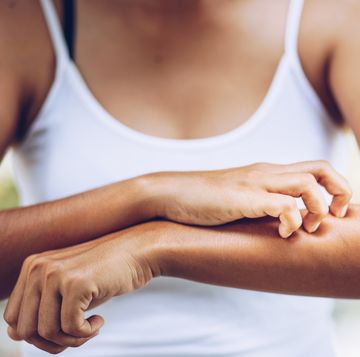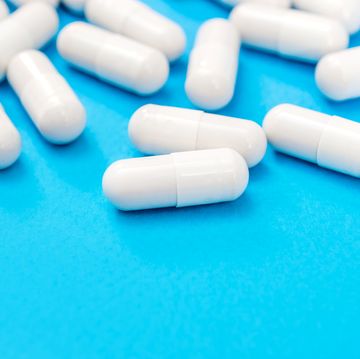Depression is a serious medical condition, and the decision to take antidepressants can be just as big of a deal. "I think of medications as bandages," says Eva Selhub, MD, a lecturer in medicine at Harvard Medical School and author of Your Health Destiny. "If you're bleeding, you need the bandage so that your body can focus its energy on getting stronger and healthier, not on creating a clot." Additionally, seeing a therapist, changing your behavior, establishing healthy eating, sleeping, and exercising habits, socializing and joining groups—doing all the things that will improve your mood—should be part of your long-term plan to fight depression.
But before you make a decision about antidepressants in your treatment plan, it's important to do some thinking. We talked to top doctors and psychiatrists to learn the 10 questions you should ask yourself before considering antidepressants.
1. Could my depression be the result of a medical condition?
Many health conditions affect mood and can contribute to feelings of depression, notes Christine Cauffield, PhD, executive director of LSF Health Systems based in Jacksonville, Florida. Thyroid conditions and heart disease, for example, can result in depressive symptoms. "It is important to see your doctor first, to rule out medical conditions that may be the root cause of your depression," says Caulfield. Mary Ann Block, DO, author of Just Because You're Depressed Doesn't Mean You Have Depression, adds that hormonal imbalances like postpartum depression and even allergies could be to blame. "Histamine is a neurotransmitter, just like serotonin, and can cause feelings of depression," notes Block. "Additionally, deficiencies in iron, magnesium, and B vitamins can lead you to feel sluggish and down."
2. Could my depression be a side effect of another medication?
Some prescription meds have side effects that can include depression. If you recently added a new prescription at the same time you noticed your mood has been affected, talk to your doctor about all the meds you're on to ensure there are no unintended depressive consequences, says Taliba M. Foster, MD, a board-certified psychiatrist with practices in New York and Philadelphia.
MORE: 9 Highly Effective Treatments For Mild Depression
3. Have I suffered a recent loss?
Remember that it's not unusual to feel intense emotions following a death, divorce, relocation, or retirement. "It's important to remember that antidepressants treat symptoms and not root causes," says Ramani Durvasula, PhD, a licensed clinical psychologist and author of You Are WHY You Eat. She notes that learning coping methods through cognitive behavioral therapy should be the first step when it comes to dealing with situational depression. Also, you should ask yourself how long you've been depressed. "Depression lasting for less than six months or so may not require medication, especially if it has been alleviated, even temporarily, by therapy or other methods," says Michael J. Salamon, PhD, a psychologist at North Shore Hospital in New York.
4. Am I exercising enough?
Research indicates that regular exercise boosts the serotonin levels in our bodies, resulting in improved mood and energy levels, says Foster. She suggests trying to increase your exercise regimen to see if you experience a decrease in your symptoms. Aerobic exercise in particular can be effective in both preventing and treating depression, says Will Courtenay, PhD, a psychotherapist based in Oakland, California. "It's a combination of the feel-good brain chemicals—like neurotransmitters and endorphins—and the reduction of immune system chemicals that can worsen depression." (Add activity to your day with these 25 easy ways to add in 10 minutes of exercise.)
5. Am I eating a healthy, well-balanced diet?
A sugar-heavy diet can cause a severe drop in blood sugar levels, which can lead to feelings of low energy and depression, says Foster. Additionally, gastrointestinal issues can lead to mood problems including depression. "Increasing your probiotic and veggie intake can be a step in the right direction," says Selhub. Other things to add to your diet: Courtenay notes the beneficial dietary factors associated with omega-3 fatty acids (from foods such as salmon, tuna, mackerel, dark green vegetables, flaxseed, nuts, and soybeans) as well as vitamin B12 (from foods such as seafood, low-fat dairy products, and fortified cereals). "Complex carbs have been found to raise the level of serotonin in your brain, so a baked sweet potato or whole-wheat pasta are good choices," he adds.
MORE: Your New Antidepressant Goes Remarkably Well With Blueberries
6. Am I socializing on a regular basis?
The saying "No man is an island" has strong implications when dealing with depression. "Those that isolate or have poor social support systems report greater feelings of sadness," says Foster. "Be sure to connect with friends and family; join a local group in your community or take a continuing education class to learn new skills and meet new people." Social support is strongly linked to improved mental health and decreased stress, says Courtenay.
7. Am I getting enough sleep?
"Research shows that normal, healthy adults who go without good sleep for just one month begin to show clinical signs of depression," says Courtenay. And a lack of sleep can make even the most level-headed person become irritable and short-tempered. "Sleep deprivation leads to changes in the brain, which include changes in neurochemicals and in hormones," Courtenay says. But many adults don't get enough sleep. "The cut-off for good health is getting at least six hours," he notes. If you have problems with sleeping, it's important to nip it in the bud because it can quickly lead to anxiety and depression. One simple step is to watch your caffeine intake. Not only will you sleep better, but you'll feel less cranky, jittery, and anxious. (End your sleep troubles with these 20 ways to sleep better every night.)
8. Have I tried to reduce my stress or anxiety?
One of the best pieces of advice that can be given to treat depression is to fight it, says Hal Pickett, PsyD, a psychologist who works for Headway Emotional Health Services in Minneapolis. "It feels at times like the flu, but the treatment is the opposite. When you feel least like getting out of bed, that is the most important time to drag yourself out and get busy. When you least feel like exercising, that is the time to get some fresh air and go for a walk. And when you least feel like socializing, that is the time to call a friend and have a coffee and conversation. Medication like antidepressants may help with mood or even sleep and appetite, but it will not change your behavior. You have to purposefully change that part."
Some other positive ways to change your behavior are to engage in mindful practices such as meditation, yoga, tai chi and even going to church, says Foster. "These activities have been shown to reduce depressive symptoms and increase an overall sense of well-being." Also, look at your triggers. Are you in an unhealthy relationship or doing a job you hate? Often, tough decisions that we continue to avoid making contribute to our feelings of helplessness or depression. Talking to a trained therapist to come up with a plan to change your behavior, or aspects of your life, is a good first step.
9. Am I drinking too much?
Rather than helping you with your problems, an increase in alcohol use typically makes things worse. "There's good science indicating the abuse of alcohol can actually lead to depression, and long-term alcohol use has also been linked with anxiety," says Courtenay. Alcohol can also interfere with good sleep, further compounding the problems of anxiety and depression. Because alcohol makes us less inhibited and more impulsive, it also makes us more prone to anger, aggression and violence, Courtenay notes. "Research shows that if you do drink, it's best for your health—both physical and mental—to limit it to two drinks a day."
MORE: 9 Surprising Signs Of Depression
10. Do I have a long-term plan for dealing with my depression?
"Sometimes, no matter what you try—changing your diet, taking supplements, working with a therapist, or exercising—the darkness still looms; you may want to think about taking medication, especially if you find that the depression is inhibiting your daily functions," says Selhub. So if you're seriously considering going on antidepressants, you should also have a plan for going off the meds, she says, and recommends weaning off antidepressants in 6 to 9 months after new coping habits have been formed—under the supervision of your doctor.














